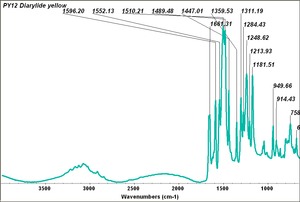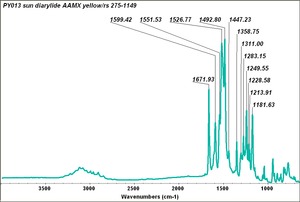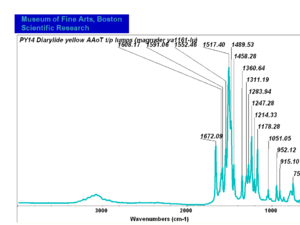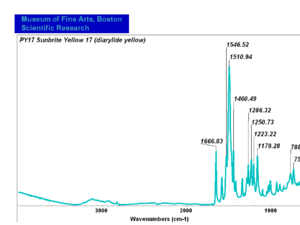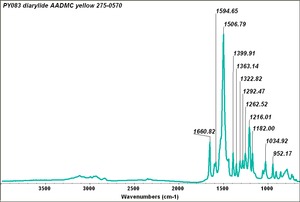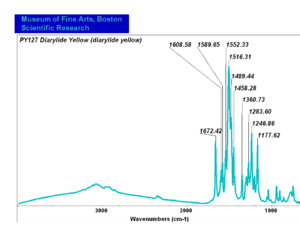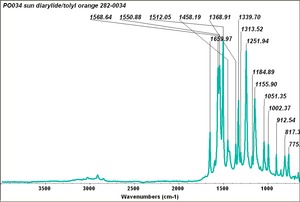Diarylide dye
Jump to navigation
Jump to search
Description
A class of synthetic yellow, orange, and red organic colorants. Diarylide dyes are insoluble direct azo dyes that were first synthesized from benzidine in 1911. They were not widely used until the 1930s. Diarylide yellows have good tinting strength, opacity and solvent resistance. They have fair to good lightfastness and are primarily used in printing inks, plastic, rubbers, as well as architectural and artists paints.
See also Arylide.
Synonyms and Related Terms
diarylide dyes; disazo dye; benzidine yellow; Pigment Yellow 12; Pigment Orange 13; Pigment Red 41; Pigment Yellow 83; benzidine orange
Comparisons
| Pigment number | Manufacture | Pigment name | Manufacture CI number | Comments |
|---|---|---|---|---|
| PY012 | unknown | diarylide yellow | unknown | |
| PY013 | Sun | diarylide AAMX yellow_rs | 275-1149 | |
| PY014 | Sun | diarylide AAOT yellow | 274-1744 | FTIR spectra appear the same for all PY014 |
| PY014 | Magruder | diarylide yellow AAoT t-p lumps | ya1161-lu | FTIR spectra appear the same for all PY014 |
| PY014 | Magruder | diarylide yellow AAoT s_o | ya1283-dc | FTIR spectra appear the same for all PY014 |
| PY017 | Sun | diarylide AAOA yellow | 275-0023 | |
| PY083 | Magruder | diarylide yellow | yr1300-dc | FTIR spectra are the same for Sun and Magruder PY083 |
| PY083 | Sun | diarylide AADMC yellow | 275-0570 | FTIR spectra are the same for Sun and Magruder PY083 |
| PY127 | unknown | diarylide yellow | unknown | |
| PO034 | Sun | diarylide tolyl orange | 282-0034 |
Physical and Chemical Properties
Resistant to alkalis and heat.
Risks
Highly toxic. Suspected carcinogen and teratogen. May cause bladder cancer. .
Resources and Citations
- Michael McCann, Artist Beware, Watson-Guptill Publications, New York City, 1979
- Monona Rossol, The Artist's Complete Health and Safety Guide, Allworth Press, New York, 1994
- Thomas B. Brill, Light Its Interaction with Art and Antiquities, Plenum Press, New York City, 1980
- B. Berrie, S.Q. Lomax, 'Azo Pigments: Their History, Synthesis, Properties and Use in Artists' Materials', Studies in the History of Art , National Gallery of Art, Washington DC, No. 57, 1997
